Getting sick when you travel is never fun but contracting a virus such as Dengue Fever can really ruin your holiday. Living in India, dengue fever was always a concern but over the three years that we lived in New Delhi, we discovered how to prevent dengue.
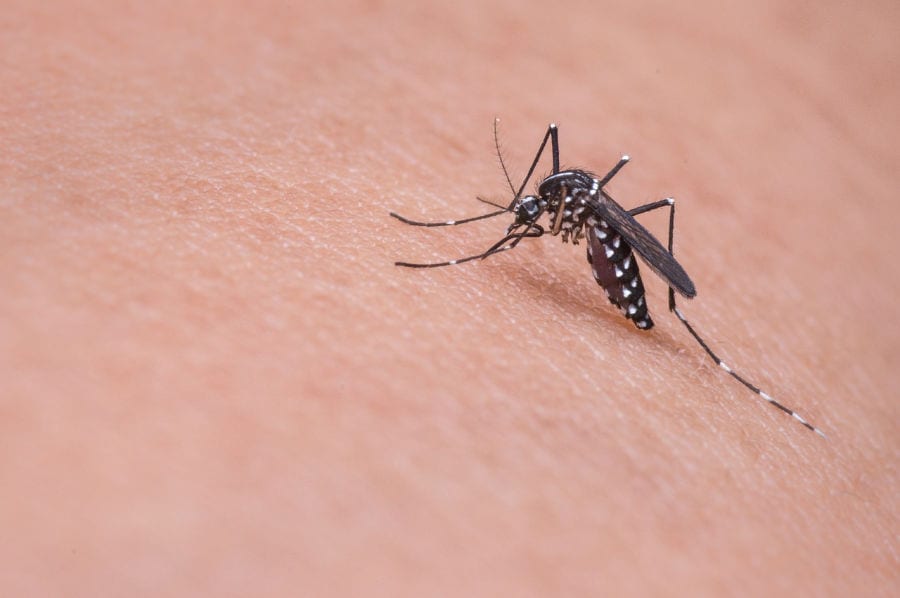
Dengue Fever is a virus transmitted by the female Aedes aegypti mosquito. This species prefers to live in or near human habitats and tend to bite during the day (as opposed to malaria, where these mosquitoes attack during the night). Dengue is also known as ‘break bone fever’ owing to the severe joint and muscle pain victims experience.
This article was written with assistance from Dr. Vineet Datta and International SOS
Disclosure: This post may contain affiliate and commercial links. If you make a purchase or booking after clicking on the link then globetotting receives a small commission; if you don’t then we don’t! These are not pay-per-click links. For more information see our disclosure policy.
How to prevent Dengue
Table of Contents
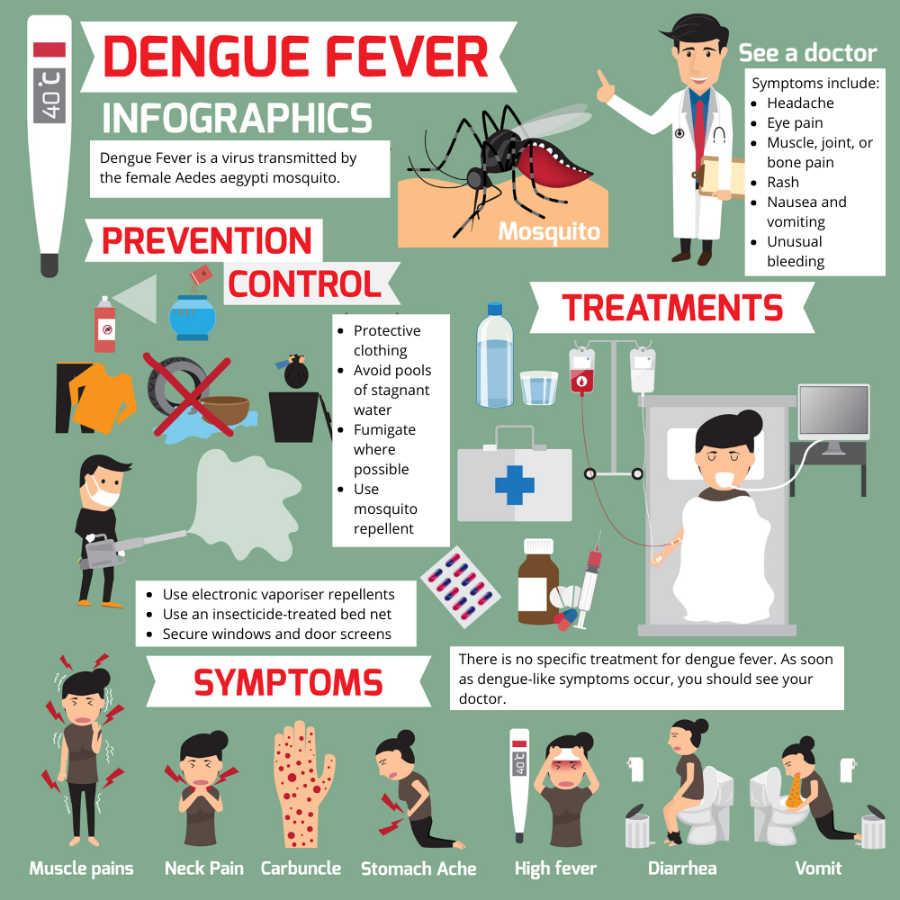
Before 1970 only 9 countries had experienced severe dengue epidemics. Today, however, the disease is endemic in more than 100 countries and the World Health Organisation estimates that between 50 – 100 million infections occur worldwide every year. The Americas, South-East Asia and Western Pacific regions are the most seriously affected. If you are travelling to countries where dengue is prevalent (or, live in a country affected by dengue) then it’s vital that you take precautions. Take a look at this post for the best mosquito repellent for babies and kids.
Where is Dengue Fever found?
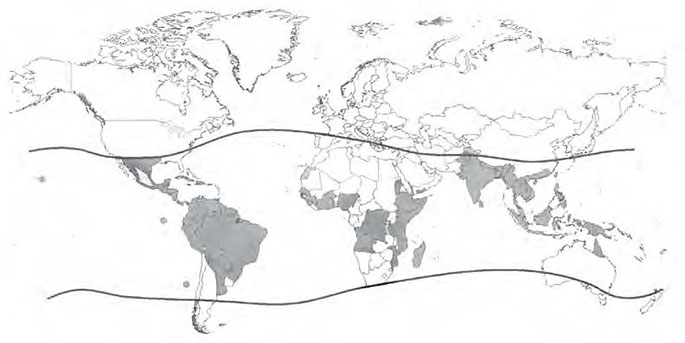
Dengue fever is most prevalent in the Indian subcontinent, Southeast Asia, Southern China, Taiwan, the Pacific Islands, the Caribbean, Africa, Mexico, Central and South America. Mosquitos carrying dengue are mostly likely to be found in urban and semi-urban areas.
In many parts of the tropics and subtropics, dengue is endemic. This means that it occurs every year, usually during the season when the Aedes mosquito populations are high. This generally means during the monsoon period or times of heavy rainfall; rainfall is optimal for breeding.
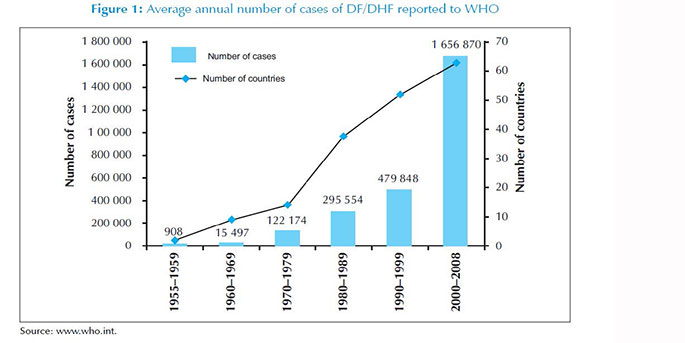
Dengue symptoms
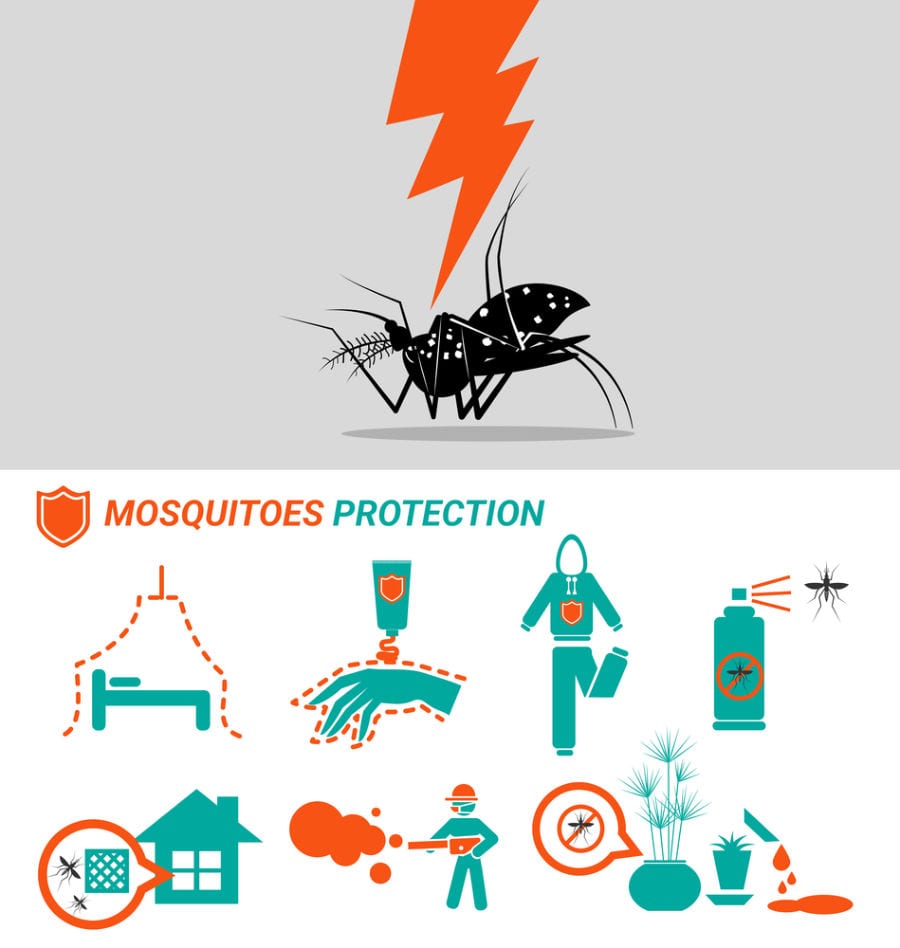
Often called ‘break bone fever’, Dengue symptoms are similar to having the flu. Some people infected have mild or even no symptoms. About one in four people infected with dengue will get sick.
Dengue fever may occur from three to 13 days after being bitten by an infected mosquito. Symptoms usually appear within four to seven days and usually pass within a couple of weeks. However, it can take several weeks to make a full recovery. It’s common to feel very tired in this recovery period.
There are four distinct strains of the dengue virus, and recovery from infection by one provides lifelong immunity against that particular serotype. Cross-immunity to the other serotypes after recovery is only partial and temporary. Subsequent infections by other serotypes increase the risk of developing severe dengue.
Dengue symptoms include:
- Headache
- Eye pain (usually behind the eyes)
- Muscle, joint or bone pain
- A skin rash
- Nausea and vomiting
Severe dengue is an emergency and should be treated immediately. If any of these symptoms appear, you should go to an emergency room straight away.
- Severe stomach pain or vomiting
- Bleeding from the nose or gums
- Vomiting blood or blood in the stool
- Drowsiness or irritability
- Pale, cold or clammy skin
- Difficulty breathing
Dengue Treatment
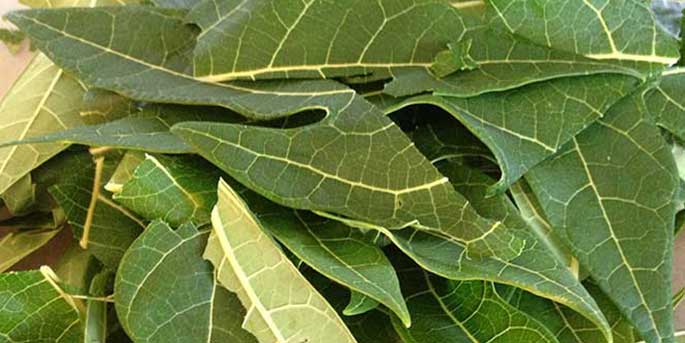
There is no specific treatment for dengue fever. As soon as dengue-like symptoms occur, you should see your doctor. You can take paracetamol to relieve the pain and fever (not asprin or ibuprofen, however, as they can cause bleeding problems). Drink plenty of fluids and rest. Some people who have suffered from dengue have found that drinking raw papaya juice helps increase their blood platelet count. Although this isn’t scientifically proven, it is always worth a try. Pomegranate juice and Aloe-Vera juice are also believed by some to be effective.
Dengue remedies
The following are some additional natural dengue remedies that may help:
- Squeeze half a lemon into a glass of fresh apple juice and drink 2-3 times a day.
- Squeeze fresh papaya leaves until juice appears and drink two tablespoons, 1 – 2 times a day (don’t boil the leaves first)
- Drink grapefruit juice 2-3 times a day
- Boil lemon grass in water and add honey.
- Black grapes, tomatoes, pomegranate, cherries and watermelon juices have strong antioxidant properties believe to help increase platelet levels.
- Carrot and cucumber juice is though to help patients dealing with the after-effects of dengue
Dengue Prevention
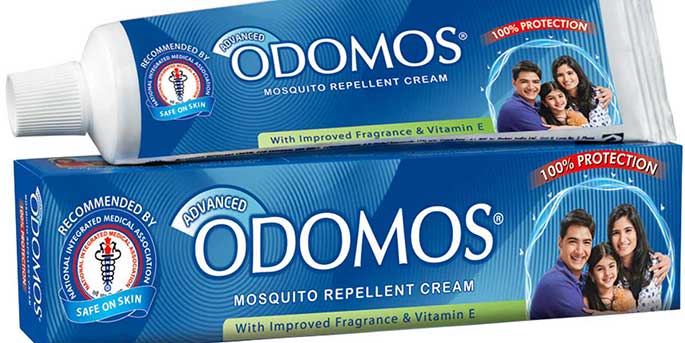
There is no vaccine against dengue fever, although research is ongoing. Dengue, however, is preventable and steps can be taken to prevent being bitten.
The following list of ways to prevent dengue is aimed at both visitors travelling to, and families living in, countries that are at risk of dengue fever.
Use mosquito repellent
One of the most effective ways of preventing dengue is using mosquito repellents on exposed skin. DEET, Picaridin, Oil of Lemon Eucalyptus and IR3535 are effective. Clothing can also be treated with repellent. Here are some of the best mosquito repellents that we’ve found for babies and kids.
For kids Health Canada recommends that DEET-based products be used on children between the ages of 2 and 12 only if the concentration of DEET is 10% or less and that repellents be applied no more than 3 times a day. Children under the age of 2 should not receive more than 1 application of repellent in a day. Generally, the duration of protection varies with the DEET concentration: higher concentrations protect longer. Do not apply repellent to kids’ hands so there is no chance of them ingesting it or rubbing and irritating their eyes. Oil of lemon eucalyptus is not recommended for kids under 3 years old.
Children should sleep in rooms with air conditioning or screened windows or sleep under bed nets, when available. Mosquito netting should be used over infant carriers. Children can reduce skin exposed to mosquitoes by wearing long pants and long sleeves while outdoors in areas where malaria is transmitted.
The following are some of the best repellents for dengue mosquito that we have used and found effective:
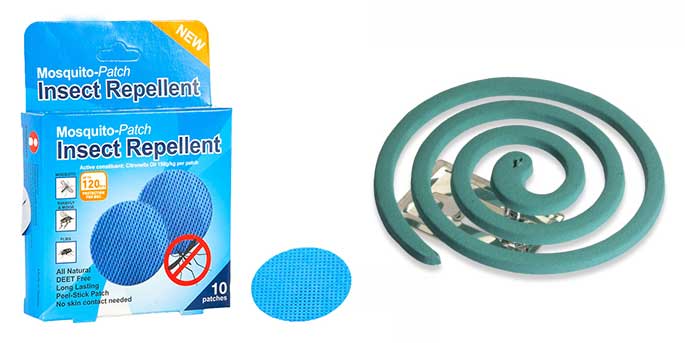
- Mosquito Repellent Patch These citronella-infused stickers can be stuck on the backs of kids’ clothing. The better quality ones can be reused (lasting for up to 3 days). Non-toxic, DEET-free and no skin contact.
- Odomos Mosquito Repellent Cream is a highly effective and clinically proven mosquito repellent that is safe for kids.
- Mosquito Repellent Bracelet Many of these citronella-infused silicone wristbands are long-lasting and waterproof. These are a good option for older kids (younger children might try and eat them!).
- Mosquito Repellent Wipes
Like wet wipes these are easy to use and particularly good for little kids. Various brands are available; we’ve tried the DEET-free Pigeon anti-mosquito wet wipes and found them to be effective.
Wear protective clothing
Cover as much of your skin as possible. Wear long sleeves, long pants / trousers, socks and covered shoes. Light coloured clothing is less attractive to mosquitoes than dark colours.
Avoid mosquito-attracting smells
Perfume and sweat attract mosquitos like bees to pollen; shower to remove sweat and use unscented sunscreen and shampoos.
Use mosquito deterrents in the home
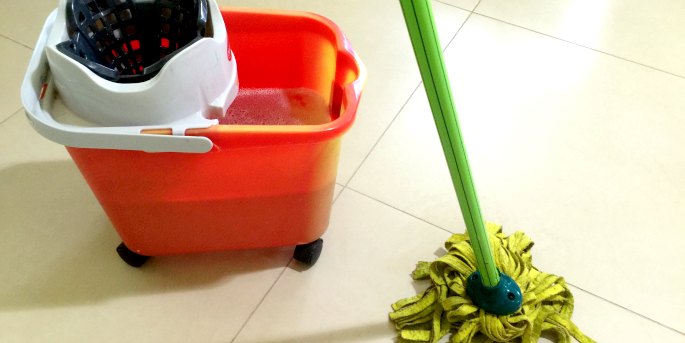
- Numerous Electronic Insect repellents
for keeping mosquitoes at bay are available but it is important to remember that the fumes inhaled by kids might cause allergic reactions.
- You can also use mosquito repellents, which are either applied on the body or in contact with the skin. Various other alternatives available in India include Citronella Balm, Odomos Naturals, anti-mosquito wipes etc. These should be used in addition to long sleeve clothing as well as use of mosquito nets.
- Marigolds and lemon grass are natural insect repellents and can be planted around your house and garden. Add a drop of citronella oil or lemon grass to the water you mop your floors with.
- Use an insecticide-treated bed net. Make sure the net does not have any tears. Tuck the ends in under the mattress, or make sure it reaches the floor.
- When inside, use air conditioning if available.
- Make sure window and door screens are secure and free of holes.
- Homemade remedies such as cloves stuck into oranges or lemons may help to repel mosquitos – and flies!
Avoid breeding grounds
Mosquitoes are more likely to be found in areas where they can breed, such as stagnant pools. Make sure there are no unnecessary collections of water in your home (e.g in paddling pools, old tyres, pot plant dishes, etc.)
Wear an invisibility cloak!
Less Harry Potter and more a possible lifesaver for mosquito-plagued people are these ‘cloaks’ developed by US Scientists to block mosquitos’ ability to smell and target their victims.


Great to see advice regarding dengue making to the travel blogs. Preventing mosquito breeding it important – people should be advised to rinse out pot plant holders and bromeliad plants once a week. Also, mosquito repellant surface spray under beds and furniture is a must. Unfortunately there is no evidence that the natural repellants work (although they might) given that dengue can and does kill people, when I have been involved in dengue outbreaks we haven’t recommended these natural repellants and people may chose them over those that are proven to work.
Hi Danielle,
Thanks for your comments and suggestions. I agree that spraying mosquito repellant under beds and furnitures is a very good idea. Personally, when we lived in an area where Dengue was prevalent, I would prefer to use a DEET product as I was confident that this was effective. That said, Odomos is a fantastic cream / spray that is very effective. Thanks again for your comments! – Katja
So helpful – thanks! I didn’t know about the choices available now like the bands and patches, so we are going to get them for our travels to Mexico and Central American now.
I’m so pleased you found it useful! The patches are really great, we used them all the time in India.
Thank you very much. It’s a very useful and comprehensive article. The only thing I would suggest adding is that during dengue season is best to do not use any medicine that contains ibuprofen. Paracetamol is ok but apparently ibuprofen can create additional problems in case of dengue.
Thank you, that is really interesting. I had not heard of the link between ibuprofen and dengue before but I’m going to look into it now. Thanks!
I’ve heard people repeat ‘aircon keeps mosquitos away’ – but it appears to me all you need is a fan to disrupt airflow – and their CO2 homing abilities. Some vague point about insects disliking cooler temperatures – but Ive seen no evidence.
Why would aircon be better than a fan?
Mosquitos don’t like cold air and A/C tends to be colder than fans. That is my understanding!